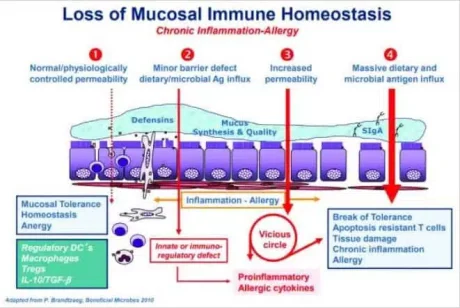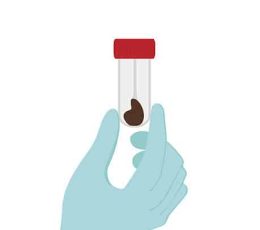
Leaky gut is a term that gets thrown around quite often.
Hippocrates, considered the Father of Modern Medicine, some 2500 years ago, considered that “All disease begins in the gut”. While his insight was profound, it was not widely embraced except in natural medicine circles.
Fast forward to the 21st century and the rest of the health-oriented profession is catching up. New insights into the causes of almost every chronic disease has been shown to have a gut and/or gut microbial component.
And the human microbial system is centered in the digestive system.
While previously it was thought one had to be genetically predisposed and then exposed to some kind of environmental trigger, we now know it’s not just the gut, but that when it is ‘leaky’ these increase the risk of almost every chronic inflammatory disease.
Not only obvious inflammatory, but infectious, allergic, neuroinflammatory, neurodegenerative, autoimmune diseases, and cancers.

How can the Gut Leak?
The lining of the human intestine is very thin. Actually one-cell-thick (thin). So this single layer of cells is incredibly important. The gut lining houses the largest number of immune cells in any organ in the body. Anything that disrupts it can result in damage, allowing particles to “leak” through into the lymphatic and general circulation, plus impair normal nutrient uptake due to the the damage caused.
Now, there is a growing evidence base indicating that an altered composition of the gut microbiome and therefore its function, is implicated as a cause of altered gut permeability.
Some foods are specifically problematic in regards to the integrity of the gut. Right at the top of the list is gluten-containing foods, of which wheat is the most prolific in most people’s diets.
What Happens to Cause Leaky Gut?
Meet Zonulin. Zonulin is a linking molecule – it holds cells together. Think of it as a linking chain or bridge. One of the functions of zonulin is to relax the tight junctions of the intestinal cells, which allows movement of molecules between the cells – this is one of the major mechanisms regulating intestinal absorption. When this layer is disrupted, the ability of the cells to prevent excess movement of molecules in impaired.
How Does Gluten Cause Leaky Gut?
When wheat (and other glute-grains) are disassembled in the digestive system, the component proteins, gluten and gliadin are liberated. These proteins trigger the release of zonulin from the gut lining. It is thought that gluten is seen as a potential harmful component of a microorganism and the zonulin system activates, to “flush out” the potentially problematic organism. This is a bad thing, as zonulin has a critical role in holding the gut cells together.

Gluten, found in wheaten bread can trigger leaky gut.
What Else Causes Leaky Gut?
A key culprit is non-steroidal anti-inflammatory drugs (NSAIDs). These include ibuprofen, voltaren, even aspirin. A study of professional athletes determined a higher-than normal incidence of intestinal permeability, verified with both lactulose-mannitol challenge testing and measure of zonulin in the stool. In this study, the athletes were excluded if they had used NSAIDs in the previous month, suggesting that the intensity of exercise was a key factor, and/or NSAID-induced damage to the gut lining was unresolved.
Another common cause of leaky gut is small intestinal bacterial overgrowth (SIBO). SIBO occurs when bacteria are present in the small intestine in larger amounts than is normal. Not only is zonulin activated to “flush” out the bacteria, but the associated low-grade inflammation also causes damage to the gut lining. So it is important to determine what is causing the leaky gut, before attempting to treat it.
What Are Some of the Conditions Associated with Leaky Gut?

There are numerous studies linking changes in zonulin to chronic inflammatory diseases. This list may well grow as research in this area increases. Indicated in brackets () is the type of study. Human studies usually follow animal studies which support the theory.
- Aging (human)
- Ankylosis spondylitis (human)
- Attention deficit hyperactivity disorder (ADHD) (human)
- Autism (human)
- Coeliac disease (human)
- Chronic fatigue syndrome/myalgic encephalomyelitis (human)
- Colitis – inflammatory bowel diseases (human & animal)
- Environmental enteric dysfunction (human)
- Gestational diabetes (human)
- Glioma (human & cell studies
- Insulin resistance (human)
- Irritable bowel syndrome (human)
- Hyperlipidaemia/high cholesterol (human)
- HIV (human)
- Major depressive disorders
- Multiple sclerosis (animal & human)
- Necrotizing enterocolitis (animal & human)
- Multiple sclerosis (human)
- Necrotizing enterocolitis (human)
- Non-alcoholic fatty liver disease (human)
- Non-celiac gluten sensitivity (human)
- Obesity (human)
- Schizophrenia (human)
- Sepsis (human)
- Type 1 diabetes (human, animal)
- Type 2 diabetes (human)
- …and this list continues to grow.

How Can I Get Tested?
We offer the following assessments for measuring your degree of leaky gut (or inteestinal permeability):
- a simple urine collection, after taking a drink of two different kinds of sugar. You can order it here.
- a stool test that measures the antigen zonulin in your faeces. You can order it here.
- a blood test to measure serum levels of zonulin family protein – order here
Test results are best delivered in the context of a professional consultation. The result is interpreted by a trained health professional in light of your current health condition, which helps to define a pathway forward for you.













